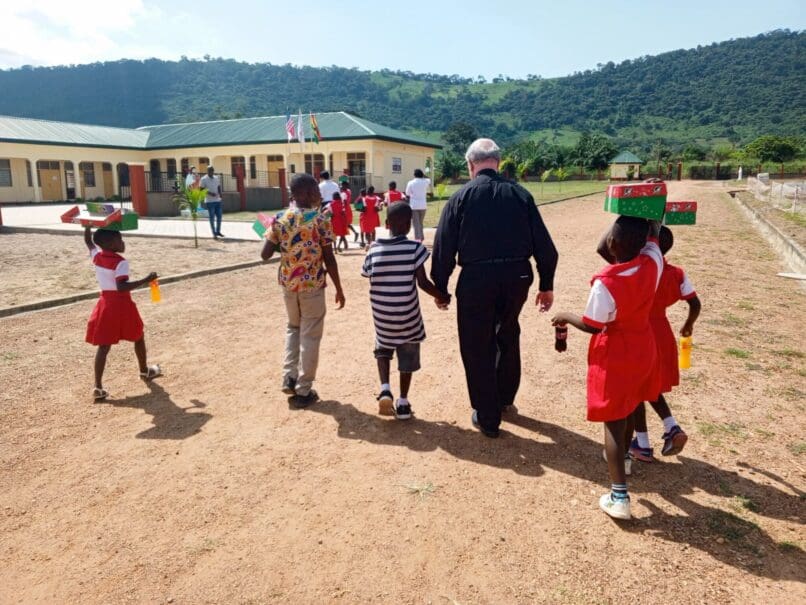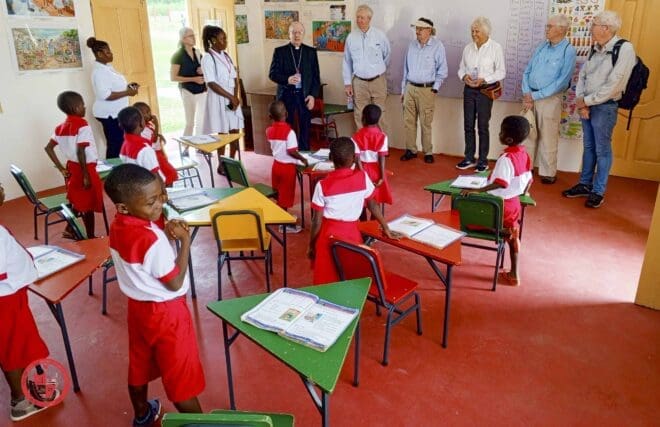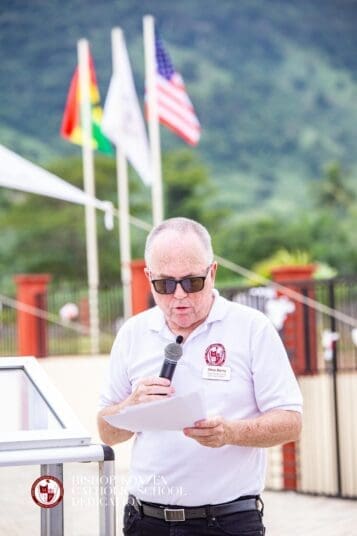 Photo Courtesy PFSHC
Photo Courtesy PFSHCAtlanta
Bishop Konzen, Atlanta Catholics tour Ghanaian school, health centre
By NICHOLE GOLDEN, Editor | Published December 1, 2023
ATLANTA—Following his first visit to the Pope Francis School & Health Centre (PFSHC) in Ghana, West Africa, Bishop Joel M. Konzen, SM, of Atlanta called the campus “serene and striking.”
Bishop Konzen and a group of Atlanta Catholics, led by the program’s founder Mike Barry, visited the Volta region of Ghana from Oct. 21-28.
Mike Barry, a former parishioner at St. Philip Benizi Church in Jonesboro, founded the outreach in 2014 to serve children who are orphans and have chronic health conditions. He now lives in Arizona.
The delegation toured classrooms, monitored the progress of construction of a multi-purpose building on site, visited an HIV unit at a local hospital and the Cathedral of the Sacred Heart in the Diocese of Ho.
“For me an especially memorable feature of the visit was driving onto the property and seeing this impressive campus that pops up like a jewel, amid verdant hills only half a mile or so away.” shared Bishop Konzen.
A new school, named for the bishop, is part of the PFSHC program. An anonymous donor enabled completion of the school’s construction. The donor requested the school be named for Bishop Konzen, a longtime Marist educator. The school features a library and computer lab for children in grades K-4 through ninth. A chapel will eventually be named for St. Francis.
Barry said the multi-purpose building will provide a space for dining, for celebrating Mass until a chapel is complete and will feature a stage for fine arts productions. Supporters have contributed 82 percent of the needed funds for the project so far.
“It’s an incredible building,” said Barry.

Bishop Joel Konzen and Atlanta Catholics visit a classroom at the Pope Francis School and Health Center in Ghana, West Africa. Photo Courtesy PFSHC.
He said Atlanta’s Catholic community members, including school and church groups, have been dedicated supporters of the program since its beginning.
“It’s nice to have people who committed to this,” he said.
Bishop Konzen said he was so impressed with what the founder and the generous Atlanta supporters of the school and centre have accomplished.
“They’ve created a high-quality living, schooling, and medical treatment experience for young people who would otherwise be forgotten or, at best, vastly underserved. In order to make such a difference in the lives of individuals, it’s necessary to buy into the belief that God wants all of His creation to thrive, especially the young, who deserve an opportunity to live healthy and productive lives,” said Bishop Konzen.
He said the basic Christian virtues of faith, hope, and charity are in evidence everywhere at the Pope Francis School and Health Centre.
Some 55 students live in the program’s dormitories, with additional young people from the community attending as day students. The school now has 26 staff members including teachers, nurses, security staff and a gardener.
During the visit, the bishop blessed the new school. Community leaders attended the ceremony as students presented songs and poems in celebration of the day.
“It was quite an event,” said Barry.
In addition to the multi-purpose building being completed, another important endeavor is securing sponsorships for children.
“They start at $25 a month,” said Barry.
The sponsorships provide for the students’ health needs as well as academic resources, and donors get a monthly update on how the child is doing. Each child visits the hospital on average two to three times a year due to respiratory or skin problems or other chronic conditions related to malnutrition in their early lives. Sponsorships help cover clean water, vitamins and nutritious meals.
Bishop Konzen recalled witnessing the students opening gift boxes from the charity Samaritan’s Purse during his visit.
“I loved the chatter and high spirits once they opened the boxes, but I was especially moved to hear their answers to the questions about their faith that preceded the distribution,” he said. “They know their prayers and the explanation of their Christian faith in English, which is a second language for the children.”
When the school first opened none of the children spoke functional English or were at their academic grade level.
“We did nothing the first year but reading,” said Barry. The school added social studies and math courses later and the school now has internet access. The oldest students are 15 and 16 and just entering junior high school with vocational training being explored as future opportunities for them.
Upon his return from Ghana, Bishop Konzen answered questions about his trip to Ghana:
Georgia Bulletin: Can you share observations on what the school and health centre program means to the community at large?
Bishop Konzen: The school and health center are seen as an important asset to the local community. At the dedication ceremony, the paramount chief for the area, the principal local leader, attended with other area chiefs, wives, and relatives. He commented at length on what it will mean to have high-quality health care available not only for the students but also for all in the surrounding area. People don’t have access to cars and public transportation in Ghana as we’re accustomed to. For them to have health services that they can walk to or ride a bicycle or motorbike to means that they will have ongoing care and that some of what we might consider routine health maintenance measures will be available to them. The children in the school have monthly check-ups and are able to have a very nourishing diet, meaning that their medications are effective, and they look and feel healthy. The school has 20 or so day students who walk to school each day. Some of their parents attended the dedication; it was clear how much they appreciate the opportunity for their children to attend the school, which is a kind of oasis with typical Catholic characteristics in instruction, staffing, and excellent individual attention.

Michael Barry, founder of the Pope Francis School and Health Centre, speaks at the blessing.
GB: What encounters or experiences have remained with you from the trip?
Bishop Konzen: For me an especially memorable feature of the visit was driving onto the property and seeing this impressive campus that pops up like a jewel, amid verdant hills only half a mile or so away. With the school buildings on three sides, there is a paved central courtyard where the school assembles, an outdoor pavilion for Masses and meals, a farm and farm animals, dormitories for the 50-some boarding children, the health center, statues of the Blessed Mother and St. Anthony, and a large multipurpose building under construction that will seat two hundred for meals and performances. The whole effect is stunning, especially given the remote surroundings. It is serene and striking.
As part of the dedication ceremony, students performed dances, read poems, and sang. It was such a treat to see them enjoying demonstrating their talents. On a different day, volunteers from Samaritan’s Purse, an American charity, visited and passed out gift boxes to the children. I loved the chatter and high spirits once they opened the boxes, but I was especially moved to hear their answers to the questions about their faith that preceded the distribution. They know their prayers and the explanation of their Christian faith in English, which is a second language for the children. And I can’t help but cite the positive outlook and the friendliness of the Ghanaian people, which shines through in the simplest exchanges, and which is so much a part of the spirit of Father Anthony Baffour, from St. Patrick’s in Norcross, who accompanied us on the days we spent in Ghana.
On our last day in Ghana, we took time to visit the Cape Coast Castle, the place of departure for over one million enslaved Africans who were sent to the New World. It was a stark contrast to the view we had just been given of what can happen when well-intentioned people from another country seek to build up the basic dignity and opportunities of God’s children in another culture. Hearing and seeing the particulars of the plight that the African slaves, from Ghana and elsewhere, experienced is a harrowing, if not surprising, course in human degradation and oppression, one we must remember and prevent from ever recurring.
GB: Can you comment on the role of the supporters of this program, particularly that of Atlanta donors and school communities, in its growth and success?
Bishop Konzen: I am so impressed with what Mike Barry, the project’s originator, and the generous supporters of the school and health center have done. They’ve created a high-quality living, schooling, and medical treatment experience for young people who would otherwise be forgotten or, at best, vastly underserved. In order to make such a difference in the lives of individuals, it’s necessary to buy into the belief that God wants all of His creation to thrive, especially the young, who deserve an opportunity to live healthy and productive lives. The basic Christian virtues of faith, hope, and charity are in evidence everywhere at the Pope Francis School and Health Center, and Mike has aptly named it, because the themes of Pope Francis’s papacy, especially the joy of the Gospel, animate the change and the goodness that disciples of Jesus Christ seek to foster. I can’t help but see also the hand of the Blessed Mother at work in the way that the children are cared for in the health center and the school. She has seen to it that people of goodwill, so many in the Atlanta area, have been moved to want to improve the lot of impoverished children halfway around the world.
GB: What were your thoughts or observations on the classroom environments and the quality of education the children are receiving?
Bishop Konzen: The education that the children are receiving is making a tremendous difference for each of them. Many of them are behind where they should be because they were previously receiving no education or inferior instruction. The teachers are extremely patient and resourceful in aiding the students to make up for the deficits that some have on arrival. This basic education is taking place at what we would term the elementary level. When students reach the point that they need the equivalent of our 8th grade, they are given daily transportation to the local middle school, and the same will happen when they reach high school capability. The hope is that after high school the students will qualify for advancing to college or a technical or trade school. The opportunities that await them after such an education are profoundly different from the void that would exist without the underpinning that a loving environment and thoughtful instruction are providing.